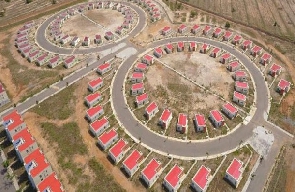Housing is one of the important ingredients for life after food and clothing. Peter Diamandis argues that "imagine a world of nine billion people with clean water, nutritious food, affordable housing, personalized education, top-tier medical care, and non-polluting, ubiquitous energy. Building this better world is humanity's grandest challenge." Thus, housing is such a basic requirement that everybody needs housing, yet a greater proportion of the Ghanaian population do not have adequate housing. This has been the situation since post Independence as the Ghanaian population continues to increase.
Over the years, various Ghanaian governments have sought to address the housing problem in the country. They have from time to time made provisions for housing in various budgets but have always fallen short of providing or constructing affordable houses to meet the housing needs of the Ghanaian people.
State institutions like the State Housing Corporation and the Tema development corporation were all set up after the post Independence era to construct adequate affordable housing units for Ghanaians. Their output has not matched the increasing need or demand for houses.
In this short piece, l discuss the housing situation in Ghana - taking a critical look at the historical development of the housing industry, by reviewing the literature on the subject. Second, I discuss why there is a shortage of houses in Ghana. Third I discuss what efforts have been made to improve the housing crisis in the country. Fourth, I make some policy recommendations and finally, I conclude the paper.
Literature Review:
In his book "Evicted: Poverty and Profit in the American City, 2016" Matthew Desmond says that "it is hard to argue that housing is not a fundamental human need. Decent affordable housing should be a basic right for everybody in this country and everywhere in the world. The reason is simple: without stable shelter, everything else falls apart". While Richie Norton argues that, "we saw an inventory problem, where there weren't enough houses for people. Because there weren't enough houses, the demand meant housing prices went up. We recognized this isn't just a problem in Laie and the islands, but a problem everywhere all over the world". Matthew Desmond further indicates that, "I don't think that you can address poverty unless you address the lack of affordable housing in the cities ". Adding his voice to the housing problem, Alphonso Jackson points out that, "the largest challenge that we face, from my perspective, is the ability to continue moving forward so the agency will have a single mission: that is, to provide decent, safe, and affordable housing." Michael Bloomberg also stresses that, "If you believe that you're making a difference and that you can leave a legacy of better schools and jobs and safer streets, why would you not spend the money? The objective is to improve the schools, bring down crime, build affordable housing, clean the streets...."
But, Thomas Sowell says "study after study, not only here but in other countries, show that the most affordable housing is where there has been the least government interference with the market - contrary to rhetoric." With a contrary view, Billy Bragg argues that, "at some point in your life you have to engage with the fact that you are part of society. Yeah the individual is the most important facet in society but unless every individual is the recipient of free health care, free education, decent affordable housing and a proper pension then only the rich and powerful will be individuals and the rest of us will be exploited by them." But indeed, Matthew Desmond makes the argument that, "we can start with housing, the sturdiest of footholds for economic mobility. A national affordable housing program would be an anti-poverty effort, human capital investment, community improvement plan, and public health initiative all rolled into one.
Historically, a housing development in Ghana began with an impetus to build houses to support British Civil Servants and expatriates. These houses were intended to be separate from the local population. This was meant to prevent the spread of malaria, yellow fever and other debilitating diseases to the white foreigners. Planning and sanitation measures were closely intertwined but little was done to improve the housing conditions of the majority of the local population. Some improvements were made to help the local people in Kumasi after an outbreak of a plague in Kumasi (Brown, 1978) and the earthquake in Accra in 1939 (Gold Coast, 1946). Creditably, some housing programs were started after the Second World War for veterans and junior Civil Servants in the 1940s and the 1950s by the colonial government.
After independence, the Ghanaian government of Osagyefo Dr Kwame Nkrumah sort to design housing policies that focus on meeting the housing needs of the local people. And indeed, subsequent government's after Nkrumah, have also tried to deliver various housing projects that focused on the majority of the working people. But unfortunately, Graham Tipple and David Korboe (1998) in their article "Housing policy in Ghana: towards a supply- oriented future", argue that "a review of past and present housing policies in Ghana, particularly the 1993 National Shelter Strategy (Ghana, 1993, Policy Planning and Evaluation Unit, Ministry of Works and Housing, Accra), indicates that, housing supply has been low or insufficient for a majority of the Ghanaian population. They further stress that the current International policies embodied in the Global Strategy for Shelter (GSS) (UNCHS, 1990) and the Global Plan of Action of Habitat II ( GPA) (UNCHS, 1996) provided a framework within which current housing policies in Ghana should be formulated with the utmost objective of cranking up housing supply to meet the ever-increasing housing demand in Ghana. Graham Tipple and David Korboe (1998) also indicate that "since 1957, the Ghanaian government's housing provision activity has been carried out in Tema New Town by the Tema Development Corporation (TDC) and in the main cities by the State Housing Corporation (SHC) which constructed about 24,000 single household dwellings between 1957 and 1990 (Ghana, 1993). But for example, it is important to mention that, government-built houses comprise about 20% of all the houses in Kumasi in 1988.
Nicholas A, Boamah (2014), in "Housing Policy in Ghana: Feasible Paths" argues that, "various Ghanaian governments since Independence recognized the important role of housing and the necessity of an efficient housing policy if the nation was to realize its full benefits or potential. Post- Independence governments of Ghana implemented various policies with the aim of facilitating the development of the housing sector. These policies focused basically on housing subsidies, public sector housing delivery; private sector-led housing markets, the establishment of housing finance institutions; rent controls; slum upgrading programs; site and service schemes; and cooperative housing schemes".
Nicholas A, Boamah (2014), further indicates that " despite the formulation and implementation of several housing policies, the country's housing sector remains undeveloped. Housing inadequacies, decay, and haphazard development is a feature of the country's housing sector. In 2010, 54.4 %, 24.3 % and 21.3 % of households respectively occupied one, two and at least three sleeping rooms with an average household size of 4.4 persons (Ghana Statistical Service, 2013). The data implies that about 78.8% of households in the country had inadequate sleeping rooms. That is, more than two people occupied one sleeping room. This state of housing in the country is appalling. It is a signal that the country's housing policies have failed to achieve their intended objectives of providing adequate and affordable housing for Ghanaians".
The National Shelter Strategy (Ghana 1993) holds the following objectives:
1. Improving the quality of Shelter.
2. Improving the environment of human settlements.
3. Making Shelter programs more accessible to the poor.
4. Promoting private sector involvement through an enabling policy environment.
5. Encouraging rental housing and
6. Promoting orderly growth with infrastructure in place.
Public and Private Sector Housing Policy in Ghana:
The National Housing policies in Ghana have a number of characteristics. It could be argued that these policies are focused on market-led housing delivery or state-led housing programs or sometimes both. Public housing programs have embedded subsidies for low-income households. Furthermore, public housing projects may also enhance the quality of housing stock and the living conditions of the people (Katz, Kling and Liebman 2001). An efficient public housing program will lead to an increase in the volume of housing units but would not crowd out privately funded housing projects. Sinai and Waldfogel (2005) note that a critical requirement for public housing is that it has a real effect on the recipients' outcomes or expectations. However, it is possible to argue that households requiring public housing may not necessarily be able to access these houses, due to the complicated eligibility criteria and corruption in program administration. Otiso (2003) indicates that "States are unable to provide adequate housing as a result of administrative, financial, and institutional weaknesses, poor planning, and rapid population growth".
Private sector-led housing programs can help overcome the challenges faced by Public housing programs. According to Dowall (1989), market-based intervention programs have the great potential of delivering services to low-income households more effectively. But this is only possible where profits earning opportunities exist. Private sector actors can easily abandon housing projects geared toward vulnerable groups and the poor (Jones and Ward 1995).
It was also realized that private sector housing programs were unsuccessful in providing housing for the poor in the Philippines as a result of low-profit incentives for private companies ( Strassman, 1994).
It is plausible to argue that low and middle-income households may be priced out of housing markets where government intervention may be absent as was the case in South Africa (Bond and Tait, 1997). That said, planning regulations could be used to compel the private sector operators to provide affordable housing for low-income groups.
Results of housing delivery from the Private Sector in Ghana:
From 1982 to 1989, funding and infrastructure grants to state housing institutions were withdrawn and rent controls on both Public and private sector housing were implemented. During the same period, the Home Finance Company (HFC) was established in 1991. The onus of housing delivery shifted to the private sector. However, HFC was unable to deliver low- cost housing or rental units for the general population. It was perhaps naive for the government of the time, to think that, this will be the case. Interestingly, leaving housing delivery to a firm which is profit-oriented without any government intervention and planning regulations was not a wise decision. Nevertheless, on a fairer basis, planning regulations could help ensure mixed housing development by private companies.
Between 1993 and 2013, there has been less involvement of the Ghanaian government in housing projects. That said, the Social Security and National Insurance Trust (SSNIT) has developed some rental properties, in the regional capitals in Ghana. It is estimated that about 3000 acres of land were acquired in 2001in Accra, Brekuso, Kuntanase, Asokore- Mampong, Wa and Amanfrom for the provision of affordable housing units for the poor working class. But these housing projects have been abandoned as various governments over the years have not had the political will and power to follow through with these housing projects.
Results of Ghana's housing policy towards the poor:
According to Boamah (2014), the provision of houses for the poor and working-class has not been significant in meeting their housing needs. Access and affordability have been challenging.
The State housing institutions have not been e?ective conduits for housing development in the country. The SHC was only able to deliver 38%
and 13 % of its targeted output under the 1959-64 and 1967-69 housing policies respectively (Tipple, 1987).
Also, the TDC was in arrears of over 20,000 housing units by 2000. The SHC delivered a total of about 20,773 housing units, 8,417 of which are in Accra since its inception in 1955(Karley, 2008). The SHC, therefore, delivered on average 415 housing units per annum for over half of a century of operations. The housing corporations and agencies received more than a proportionate amount of the housing budget but despite these huge investments they
consistently failed to meet their targets and delivered less than 6 % of the national housing need (Konadu-Agyeman, 2001).
Boamah (2014), indicates that " the bulk of the housing stock in Ghana is delivered by the undercapitalized individual households through the “Do-it-Yourself” (DIY) ?nancing process. The DIY ?nancing medium delivers housing incrementally". Housing supply is mostly done by households rather than real estate developers or government (Bank of Ghana, 2007). The
bulk of a?ordable housing supply in Ghana is through informal ways of incrementally developing and building houses (CHF, 2004). The informal sector delivers 30,000 housing units annually whilst the formal sector produces only 2,500 units at its peak (Aku?o, 2006). It is the little e?orts of individual small scale housing ?nanciers that drives housing development in the country (Konadu-Agyemang, 2001).
Government policy interventions failed to reach low income targeted groups. As pointed out by Stren (1990), the State-sponsored housing programs are notoriously prone to leakages - where the rich and the powerful rely on their in?uence and positions and take control of housing units meant for the poor. Most of the low-income households end up as tenants in the housing units that were earmarked for them due to the corruption in the allocation of the public housing units.
Despite the implementation of several housing policies and programs in the country, increases in housing stock have lagged behind population growth and there is a degradation of the existing housing stock. About 2% of the Ghanaian population rely on shift dwelling units such as kiosks, tents, cargo containers, and attachment to shops for shelter (GSS, 2002). Overcrowding, decaying properties, haphazard development, poor drainage, poorly designed structures, declining quality and inadequate access to services characterize much of the housing stock in the country; Bank of Ghana (2007); Karley (2008);
Obeng-Odoom and Amedzro (2011). The problem confronts almost all the cities and towns in Ghana. For instance, Oppong and Adarkwa (2008) observe that the housing units in Abakam in the Central Region of Ghana are structurally unstable. Ko?e and Nabila (2004) and Adjei and Kyei (2013) associate the high disease prevalence in rural Ghana to structurally defective housing and inadequate sanitation and drainage facilities. Boamah (2012)
observes that, the deteriorating government housing units in the O?nso South Municipality could have led to the poor performance of school children in the municipality.
The magnitude of the housing problem in Ghana is huge. The housing problems in the country are characterised by both a backlog in the provision of formal housing and the resultant sprawl of informal settlements (Karley, 2008).
Finance and Housing in Ghana:
Access to a?ordable and sustainable housing funds is extremely essential for the provision of adequate shelter for the citizens of a country. Buckley (1996) observes that, in the developing world, housing ?nance is in extremely short supply. Housing ?nance is mostly done through informal processes in Ghana. Housing supply in Ghana will continuously lag behind demand so long as housing ?nance and development is largely done through informal processes. Ghana will not be able to provide adequate housing if the housing ?nance markets remain underdeveloped. Availability of funds is a major challenge to a?ordable housing delivery in Ghana.
The lack of formal housing ?nance market has retarded housing development in the country considerably, as home builders have had to invest gradually out of their income. Hettne (1990) observes that the State cannot meet the housing demand needed by Ghanaians. It is therefore important that housing policies focus on developing a market-led housing ?nance system in the country.
This will ensure sustained ?ow of funds to prospective housing developers and the availability of long-term mortgages to individual home buyers.
Housing Finance for Informal Sector and Low-Income Households:
Adequate provision of housing cannot be attained if the housing ?nance needs of the informal sector and low-income households are not catered for. The informal sector employs 47.8 per cent of the currently employed population in the country (Ghana Statistical Service, 2008). The large size of the Ghanaian informal sector requires that the country’s housing policy focuses on strategies that will address the housing needs of households that rely on the informal sector for a living.
But as Ferguson (1999) observes, the characteristics of the traditional mortgage market do not suit the circumstances of the low and middle-income households. Low-income earners may be ineligible for mortgage ?nance from the formal ?nance institutions (Kinyungu, 2004). The low and middle-income, and informal sector households are incapable of satisfying the underwriting requirements of lenders (Boamah, 2011). The banking institutions oftentimes demand that collateral be restricted to certi?able earnings of prospective borrowers (Karley, 2002).
Boamah (2009), notes that the banks in Ghana require prospective mortgagors to be formally employed and have a regular monthly income in order for lending to take place.
The income of the informal sector households ?uctuate with the general ?uctuations in the Ghanaian economy. Therefore, the low-income and informal sector households may be excluded from the mortgage market by the lenders' requirements.
The informal sector and low-income households may not be able to actively participate in the country’s mortgage market. Housing for the low-income groups is rarely addressed by the private sector (developers and ?nanciers).
There is therefore the need for some form of State intervention to address the housing and housing ?nance needs of the low-income households. It is important for Ghana to develop a housing ?nance scheme that will ensure the availability of housing funds to all groups of people and the working poor.
Recommendations:
1. Ghana must, therefore, create the appropriate conditions necessary for the development of the housing sector and consequently enabling environment that can contribute meaningfully to socio-economic development.
2. A clearly de?ned and result-oriented housing policy is required if Ghana is to attain an accelerated development of the country’s housing sector and deliver housing on a sustainable basis for Ghanaians.
3. The formulation and implementation of housing policies must be made a national priority. There must be political will and commitment by the government to the development of the housing sector.
4. The housing policy must create room for both the public and private sectors to meaningfully interact to contribute to housing provision in the country. It must focus the government's intervention on the creation of the enabling environment and regulations of the housing sector whilst allowing the private sector to lead the ?nancing and the development of the housing industry in Ghana.
5. The State must exercise its supervisory responsibility for the housing sector but state regulation should not be likened to state control. The state must not monopolize housing delivery nor seek to control the private sector in the delivery and ?nancing of housing projects.
6. The housing policy must create a?ordable, e?cient and sustainable housing ?nance regimes; to adequately deal with the poor conditions and efforts to increase existing housing stock; improve the housing environment; strengthen planning controls, enforcement and increased focus on sustained housing research.
Conclusion:
In this piece, one has sought to take a critical look at the housing industry in Ghana by examining its beginnings from the colonial period to the current situation in the country.
From the analysis, houses provided to Ghanaians by various governments have fallen short of the housing needs of Ghanaians.
It was also realized in the study that finance has been a major problem for ordinary Ghanaians to acquire their own homes. Thus, Peter Reinhart argues that " the whole affordable housing thing needs a whole fresh look". While Annu Mangat points out that " people tend to think of affordable housing as a problem that uniquely affects the poor. However, in the last five years we are seeing this problem has spread to the working-class people who are priced off the market". And Fernando Ferrer points out that, "we need to address the root causes of poverty by creating more affordable housing...." Thus, we need to create an environment that strengthens the private sector in housing delivery in the country. And finally, the government must have the political will and the power to support the housing industry in Ghana in meeting the housing needs of the poor working class.
Opinions of Thursday, 26 November 2020
Columnist: Kordson Ayrakwa















